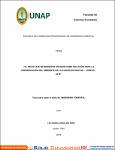| dc.contributor.advisor | Panduro Tejada, Ronald Manuel | |
| dc.contributor.author | Hidalgo Ruíz, Liz Carol | |
| dc.date.accessioned | 2017-03-17T15:07:48Z | |
| dc.date.available | 2017-03-17T15:07:48Z | |
| dc.date.issued | 2016 | |
| dc.identifier.uri | http://repositorio.unapiquitos.edu.pe/handle/20.500.12737/4323 | |
| dc.description.abstract | El presente estudio se realizó, en el distrito de Iquitos, provincia de Maynas,
Departamento de Loreto. Los resultados muestran que el 84 % afirmaron conocer el
significado del reciclaje, el 16% no conocer el significado del reciclaje. El 92 % considera
que sí es importante reciclar y 8 % considera que no es importante. El 71 %
respondieron que algunas veces aplicaban técnicas de reciclaje en sus hogares y el 5 %
respondieron que no; solo el 24 % respondieron que si aplican técnicas de reciclaje en
sus hogares. El 54% sostuvieron que el reciclaje traería consigo salubridad en la
comunidad, el 25 % indicaron que generaría mayor turismo, el 15 (%) mayor ornato y solo
el 6 % mayor economía. El 81 % manifestaron que están dispuestos a recibir talleres que
contribuyan a la educación personal en el tema de reciclaje, el 5 % contesto que a veces
lo que se traduce a de vez en cuando y un 14 % dijo que no. El 57 % respondió que la
municipalidad no imparte temas de reciclaje, el 31 % respondió que a veces la
Municipalidad imparte temas de reciclaje, y el 12 % dijo que la Municipalidad si imparte
temas de reciclaje. El 97 % respondió que es el plástico el que tiene mayores
posibilidades de reciclar, seguido del papel con el 86 %, el metal con 76 %, el vidrio con
56 % y los residuos orgánicos con el 61 %. | es_PE |
| dc.description.abstract | This present research was done in Iquitos, Maynas province, Loreto Department. The
results show that 84% claim they know the meaning of recycling; and 16% do not know
the meaning of it. 92 % consider it is important to recycle and 8% consider that it is not important. 71 % claimed that they sometimes apply the recycling techniques at home and
the 5 % claimed in the negative way; only 24 % claimed that they apply recycling
techniques at home. 54% claimed that recycling would bring health in the community,
25% indicated that it can generate more tourism, 15 (%) greater greener or grass and only
6% greater economy. 81% said they are willing to receive workshops that contribute to
personal education on the issue of recycling, 5% answered sometimes which means
occasionally and 14% said no.
57% responded that the Municipality does not impart recycling issues, 31% answered that
the Municipality sometimes imparts recycling issues, and 12% said the Municipality
conducts recycling issues. 97% responded that it is plastic which is more likely to recycle
paper followed with 86%, metal 76%, with 56% glass and organic waste with 61%. | en_US |
| dc.description.uri | Tesis | es_PE |
| dc.format | application/pdf | es_PE |
| dc.language.iso | spa | es_PE |
| dc.publisher | Universidad Nacional de la Amazonía Peruana | es_PE |
| dc.rights | info:eu-repo/semantics/openAccess | es_PE |
| dc.rights | Attribution-NonCommercial-NoDerivs 3.0 United States | * |
| dc.rights.uri | http://creativecommons.org/licenses/by-nc-nd/3.0/us/ | * |
| dc.source | Universidad Nacional de la Amazonía Peruana | es_PE |
| dc.source | Repositorio Institucional - UNAP | es_PE |
| dc.subject | Residuos sólidos | es_PE |
| dc.subject | Reciclaje | es_PE |
| dc.subject | Conservación del medio ambiente | es_PE |
| dc.subject | Zonas urbanas | es_PE |
| dc.title | El reciclaje de residuos sólidos como solución para la preservación del ambiente de la ciudad de Iquitos – Loreto – 2016 | es_PE |
| dc.type | info:eu-repo/semantics/bachelorThesis | es_PE |
| thesis.degree.discipline | Ingeniería Forestal | es_PE |
| thesis.degree.grantor | Universidad Nacional de la Amazonía Peruana. Facultad de Ciencias Forestales | es_PE |
| thesis.degree.level | Título Profesional | es_PE |
| thesis.degree.name | Ingeniero Forestal | es_PE |
| thesis.degree.program | Regular | es_PE |


